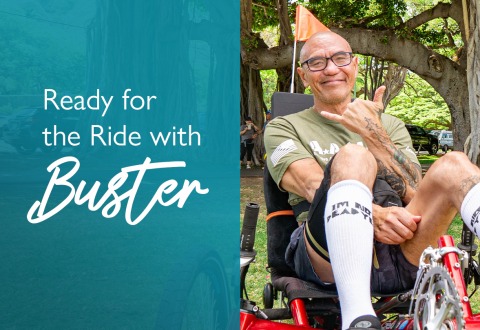
When it comes to living life to the fullest, Buster Kawasaki means business. After being diagnosed with spinocerebellar ataxia type 6 in 2008, Buster made the decision to adapt to the changes of the degenerative disease instead of letting it separate him from his passions. As a lifelong lover of sports and all things active, he became a champion for adaptive fitness in the time following his diagnosis–participating in the National Veterans Wheelchair Games, the Hawai‘i Adaptive Surfing Championships, adaptive rock climbing, and even coaching adaptive fitness at Big Tire Bootcamp.
Resilience is a key contributor to Buster’s positive outlook on life. Four years ago, Buster was thrown from his wheelchair after hitting a pothole on Kalakaua Avenue. “I went flying out of my wheelchair and landed on my hip, which broke my femur,” Buster shared. With his progress and passion for adaptive fitness on the line, there was a lot at stake in his recovery. But when asked about how he felt when he learned he’d need additional rehabilitation he said, “Eh, it happens!” and emphasized that he was just eager to do what it took to get back out there.
Buster brought his infectious can-do attitude to REHAB, spending over two weeks applying himself vigilantly to therapy sessions to rehabilitate his broken leg. “I came to REHAB motivated to move and use my legs again,” Buster shared. “My mindset was always positive, but with the support of everyone in my circle as well as REHAB’s staff, I made it through.” Buster and his therapists focused on exercises specifically tailored to bring movement back to his legs, and by the end of his time at REHAB, he was able to walk again.
Since making a full recovery from his accident, Buster is right back in the swing of things. He is a frequent attendee at REHAB’s adaptive cycling events, adaptive climbing at HIClimb and AccesSurf’s beach days. “I still do it all,” Buster shared. “I always tell myself, ‘use it or lose it!’ So I am currently working on my adaptive scuba diving certification–the ocean is my medicine!”
Though his days as a patient at REHAB are behind him, he looks back on his time positively and advises new patients, “Go with the flow and let the therapists help you. They are there to support you and get you back on your feet. And if you have a chance to go to an adaptive event…go! Give it a shot, because it could be something you love!”
